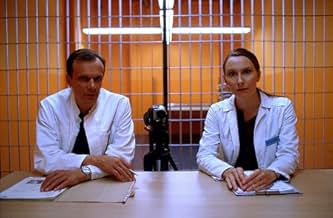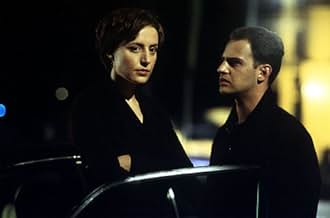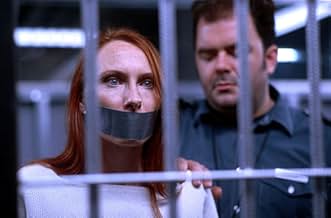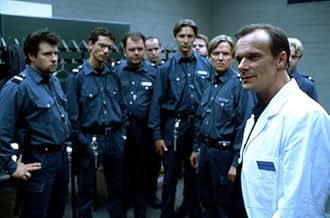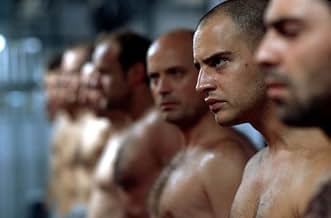For two weeks, 20 male participants are hired to play prisoners and guards in a prison. The "prisoners" have to follow seemingly mild rules, and the "guards" are told to retain order without... Read allFor two weeks, 20 male participants are hired to play prisoners and guards in a prison. The "prisoners" have to follow seemingly mild rules, and the "guards" are told to retain order without using physical violence.For two weeks, 20 male participants are hired to play prisoners and guards in a prison. The "prisoners" have to follow seemingly mild rules, and the "guards" are told to retain order without using physical violence.
- Awards
- 14 wins & 14 nominations total
- Häftling Nr. 86
- (as Thorsten J.H. Dersch)
- Berus
- (as Justus von Dohnànyi)
Storyline
Did you know
- TriviaAlthough no one died in the Stanford Prison Experiment on which the movie was based, the experiment was prematurely ended after six days out of a planned two weeks. The college students assigned (randomly) to be prisoners were "withdrawing and behaving in pathological ways" as a result of the degrading treatment they received. Quite a few scenes in the movie actually happened in the original experiment, including the early fire extinguisher scene and the prisoners being forced to clean the toilets by their bare hands.
- GoofsOn the film poster Tarek is wearing number 82, but in the film he is number 77.
- Quotes
[last lines]
Nachrichtensprecher: [voiceover - spoiler] The tragic outcome: two dead, three injured, among them project leader Professor Klaus Thon. Clearly, the experiment went out of control after two days. The district attorney is investigating two possible manslaughter charges and several charges of abuse and negligence. One of the test participants has been arrested. The project direction will probably have to answer to a court. According to statements by one of the scientists, the escalation might have been prevented by aborting the experiment earlier.
- Alternate versionsThe first cinema version had an insert in the beginning of the movie which stated "This is based on the Stanford Prison Experiment". Since Prof. Philip Zimbardo wasn't asked by the filmmakers - and the movie doesn't really show the true experiment, but an exaggeration, the insert was changed to say "This movie is based on the novel Black Box"
- ConnectionsFeatured in Visionado obligado: El experimento (2012)
- SoundtracksOne Step Closer
Chester Bennington / Rob Bourdon / Brad Delson / Joseph Hahn / Mike Shinoda
Linkin Park
Mit freundlicher Genehmigung der
Zomba Enterprises Inc. / Zomba Songs Inc. / Rob Bourdon Music
Nondisclosure Agreement Music/Big Bad Mr.Hahn Music / Kenji Kobayashi Music
(all adm. by Zomba Songs Inc.) und der Wea Records, ein Geschaftsbereich
von Warner Music Germany GmbH
Based on a true story, the notorious Standford Prison Experiment in 1971, the film tells the story of 20 men who volunteer to be placed into a makeshift prison for 12 days. Once inside, some are chosen to be guards whilst the others will act the role of prisoners, a process that involves abandoning their names, their clothing and their civil rights for the duration of the experiment.
The job of the guards is simple, maintain peace and order at all times without using physical violence.
At the heart of the film is Tarek, prisoner 77, an undercover journalist who is secretly filming from inside the prison, hoping to sell his exclusive once it's over. Tarek underestimates his own role in the experiment, though. He starts in irreverent mood, thinking it's just a game until he sparks a conflict with one of the guards, Berus. The two adversaries drive each other on relentlessly forcing the experiment to become darker, more grotesque, as each man fights for their own idea of power and identity.
Das Experiment asks what happens when good people are put in an evil place. Does humanity win over evil, or does evil triumph ? Also, it examines the role of memory when faced with extreme stress and deprivation. Whilst the film is based on a true story, it's cinematic influences can be traced back to Samuel Fuller's masterpiece "Shock Corridor" and, to a lesser extent, Chris Marker's "La Jetee". The comparisons to "Shock Corridor" are there for all to see but it's also worth noting that in all three films, the protagonists are obsessed with the memory of a girl, often using that memory as an anchor to cling on to a more idealised past, a potential escape route from the situation they find themselves in. For Tarek, as the situation becomes more extreme, the memories become stronger and stronger as he attempts to block out the present and focus on the past and a possible future with the girl.
Das Experiment is more than simple homage and pop psychology, though, largely due to it's director. In his first film, Hirschbiegel manages to create an entirely dark world, both inside and outside of the prison. Only in the final frames of the film do we see any natural daylight at all which offers stark contrast to everything we've seen before. The sense of claustrophobia, the complete lack of space, carefully manipulates the viewer throughout the film and, at times, it's genuinely unnerving. Consequently, it's difficult to find any real distance between yourself and the film as you become more and more absorbed. Like the characters within the prison there appears to be escape route for the viewer. A sparse script and real sensitivity from the actors, none of them overplaying their role, only adds further to the film's power. Moritz Bleibtreu (Run Lola Run) is particularly strong as Tarek whilst Justus Von Dohnanyi is positively menacing in the role of the sadistic guard Berus.
Hirschbiegel would, of course, develop these themes further in Downfall a few years later and in many senses, Das Experiment can be seen as a companion piece to the latter. As a debut work it's nothing short of astonishing, a director completely in control of the film and the viewer. Cinema not for the faint hearted, where you have to go the dark places first before you can see the light.
- How long is The Experiment?Powered by Alexa
Details
Box office
- Gross US & Canada
- $144,634
- Opening weekend US & Canada
- $19,857
- Sep 22, 2002
- Gross worldwide
- $13,782,896
- Runtime2 hours
- Color
- Sound mix
- Aspect ratio
- 1.85 : 1
Contribute to this page



![Trailer [OV]](https://m.media-amazon.com/images/M/MV5BOTMyNTI1MjctYTM2ZS00NmI4LThhZmUtZWExNjA2ZTllOWU1XkEyXkFqcGdeQXRyYW5zY29kZS13b3JrZmxvdw@@._V1_QL75_UX500_CR0)




